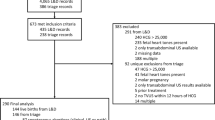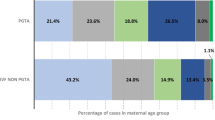Abstract
Purpose
To evaluate predictive factors for gestational diabetes mellitus (GDM) in singleton pregnancy following assisted reproductive technology (ART).
Methods
This nested case–control study was performed during October 2016–June 2017. Pregnant women who conceived following ART procedures referred to infertility clinic were selected and categorized into GDM and non-GDM based on ADA/IAPDSG criteria. The study variables including age, educational status, first-degree family history of chronic diseases, systolic and diastolic blood pressure, previous obstetric and perinatal outcomes, infertility history, and ART cycle characteristics were collected from medical records. Prediction model to develop GDM was employed by binary logistic regression analysis after adjustment for age and body mass index, family history of diabetes, and gravidity.
Results
In total, 270 women with singleton pregnancies (consisted of 135 GDM and 135 non-GDM women) conceived were studied. According to the final model, significant predictors of GDM were history of polycystic ovarian syndrome (PCOS), previous ovarian hyper-stimulation syndrome (OHSS) risk and progesterone injections. Administration of injectable progesterone during the first 10–12 weeks of pregnancy was associated with an approximately twofold increased risk of developing GDM [odds ratio (OR) 2.28, 95% confidence interval (CI) 1.27–4.09)] compared to vaginal progesterone. In addition, the regression analysis revealed that previous OHSS risk (OR 2.40, 95% CI 1.34–4.31) and history of PCOS (OR 2.76, 95% CI 1.26–6.06) were other most important predictors of GDM.
Conclusions
The route of progesterone administration, previous OHSS risk and history of PCOS seem to be putative risk factors for GDM in women conceived by ART.
Similar content being viewed by others
References
Qin J, Liu X, Sheng X, Wang H, Gao S (2016) Assisted reproductive technology and the risk of pregnancy-related complications and adverse pregnancy outcomes in singleton pregnancies: a meta-analysis of cohort studies. Fertil Steril 105(1):73–85 (e1–6 Epub 2015/10/11)
Pandey S, Shetty A, Hamilton M, Bhattacharya S, Maheshwari A (2012) Obstetric and perinatal outcomes in singleton pregnancies resulting from IVF/ICSI: a systematic review and meta-analysis. Hum Reprod Update 18(5):485–503 (Epub 2012/05/23)
Jones BJ, Zollner J, Haynes S, Cheng F, Dornhorst A (2013) In vitro fertilization treatment influences glucose tolerance in multiple pregnancy. Diabet Med 30(2):252–254 (Epub 2012/07/26)
Ashrafi M, Gosili R, Hosseini R, Arabipoor A, Ahmadi J, Chehrazi M (2014) Risk of gestational diabetes mellitus in patients undergoing assisted reproductive techniques. Eur J Obstet Gynecol Reprod Biol 176:149–152 (Epub 2014/03/19)
Zhu L, Zhang Y, Liu Y et al (2016) Maternal and live-birth outcomes of pregnancies following assisted reproductive technology: a retrospective cohort study. Sci Rep 6:35141 (Epub 2016/10/21)
Cai S, Natarajan P, Chan JKY et al (2017) Maternal hyperglycemia in singleton pregnancies conceived by IVF may be modified by first-trimester BMI. Hum Reprod 32(9):1941–1947 (Epub 2017/09/01)
Wang H, Wang Z, Meng J, Wang X, Liu L, Chen B (2017) History of infertility relates to increased risk of gestational diabetes mellitus: a meta-analysis. Int J Clin Exp Med 10(2):1909–1916
Szymanska M, Horosz E, Szymusik I, Bomba-Opon D, Wielgos M (2011) Gestational diabetes in IVF and spontaneous pregnancies. Neuro Endocrinol Lett 32(6):885–888 (Epub 2012/01/31)
Tobias DK, Chavarro JE, Williams MA et al (2013) History of infertility and risk of gestational diabetes mellitus: a prospective analysis of 40,773 pregnancies. Am J Epidemiol 178(8):1219–1225
Yildizfer F, Donma O, Yen M et al (2015) In vitro fertilization, levels of pro-inflammatory factors and lipid peroxidation. Int J Fertil Steril 9(3):277–284 (Epub 2015/12/09)
van der Linden M, Buckingham K, Farquhar C, Kremer JA, Metwally M (2015) Luteal phase support for assisted reproduction cycles. Cochrane Database Syst Rev 7:CD009154 (Epub 2015/07/08)
Palomba S, Homburg R, Santagni S, La Sala GB, Orvieto R (2016) Risk of adverse pregnancy and perinatal outcomes after high technology infertility treatment: a comprehensive systematic review. Reprod Biol Endocrinol 14(1):76
Association AD (2014) Standards of medical care in diabetes—2014. Diabetes Care 37(Supplement 1):S14–S80
Rotterdam ESHRE/ASRM-Sponsored PCOS Consensus Workshop Group (2004) Revised 2003 consensus on diagnostic criteria and long-term health risks related to polycystic ovary syndrome. Fertil Steril 81(1):19–25 (Epub 2004/01/09)
Krausz C (2011) Male infertility: pathogenesis and clinical diagnosis. Best Pract Res Clin Endocrinol Metab 25(2):271–285
Holst S, Kjær SK, Jørgensen ME, Damm P, Jensen A (2016) Fertility problems and risk of gestational diabetes mellitus: a nationwide cohort study. Fertil Steril 106(2):427–434 (e1)
Lamain-de Ruiter M, Kwee A, Naaktgeboren CA, Franx A, Moons KG, Koster MP (2017) Prediction models for the risk of gestational diabetes: a systematic review. Diagn Progn Res 1(1):3
Nunes VA, Portioli-Sanches EP, Rosim M et al (2014) Progesterone induces apoptosis of insulin-secreting cells: insights into the molecular mechanism. J Endocrinol 221(2):273–284
Rebarber A, Istwan NB, Russo-Stieglitz K et al (2007) Increased incidence of gestational diabetes in women receiving prophylactic 17alpha-hydroxyprogesterone caproate for prevention of recurrent preterm delivery. Diabetes Care 30(9):2277–2280 (Epub 2007/06/15)
Nelson DB, McIntire DD, McDonald J, Gard J, Turrichi P, Leveno KJ (2017) 17-Alpha hydroxyprogesterone caproate did not reduce the rate of recurrent preterm birth in a prospective cohort study. Am J Obstet Gynecol 216(6):600 (e1–e9)
Gyamfi C, Horton AL, Momirova V et al (2009) The effect of 17-alpha hydroxyprogesterone caproate on the risk of gestational diabetes in singleton or twin pregnancies. Am J Obstet Gynecol 201(4):392 (e1–e5)
Wolfe K, DeArmond C, How H, Henderson ZT, Sibai B (2011) The rates of abnormal glucose challenge tests and gestational diabetes in women receiving 17α-hydroxyprogesterone caproate. Am J Perinatol 28(10):741–746
Furcron A-E, Romero R, Plazyo O et al (2015) Vaginal progesterone, but not 17α-hydroxyprogesterone caproate, has antiinflammatory effects at the murine maternal-fetal interface. Am J Obstet Gynecol 213(6):846 (e1–e19)
Beigi A, Esmailzadeh A, Pirjani R (2016) Comparison of risk of preterm labor between vaginal progesterone and 17-alpha-hydroxy-progesterone caproate in women with threatened abortion: a randomized clinical trial. Int J Fertil Steril 10(2):162
Jie Z, Yiling D, Ling Y (2015) Association of assisted reproductive technology with adverse pregnancy outcomes. Iran J Reprod Med 13(3):169
Yu H-F, Chen H-S, Rao D-P, Gong J (2016) Association between polycystic ovary syndrome and the risk of pregnancy complications: a PRISMA-compliant systematic review and meta-analysis. Medicine 95(51):e4863
Kjerulff LE, Sanchez-Ramos L, Duffy D (2011) Pregnancy outcomes in women with polycystic ovary syndrome: a metaanalysis. Am J Obstet Gynecol 204(6):558 (e1–e6)
Pan M-L, Chen L-R, Tsao H-M, Chen K-H (2015) Relationship between polycystic ovarian syndrome and subsequent gestational diabetes mellitus: a nationwide population-based study. PLoS One 10(10):e0140544
De Leo V, Musacchio M, Cappelli V, Massaro M, Morgante G, Petraglia F (2016) Genetic, hormonal and metabolic aspects of PCOS: an update. Reprod Biol Endocrinol 14(1):38
Abramov Y, Elchalal U, Schenker JG (1998) Obstetric outcome of in vitro fertilized pregnancies complicated by severe ovarian hyperstimulation syndrome: a multicenter study. Fertil Steril 70(6):1070–1076 Epub 1998/12/16
Wiser A, Levron J, Kreizer D et al (2005) Outcome of pregnancies complicated by severe ovarian hyperstimulation syndrome (OHSS): a follow-up beyond the second trimester. Hum Reprod 20(4):910–914 (Epub 2004/12/25)
Haas J, Yinon Y, Meridor K et al (2014) 674: is severe ovarian hyperstimulation syndrome associated with adverse pregnancy outcome? Evidence from a large case-control study. Am J Obstet Gynecol 210(1):S329–S330
Ashrafi M, Sheikhan F, Arabipoor A, Hosseini R, Nourbakhsh F, Zolfaghari Z (2014) Gestational diabetes mellitus risk factors in women with polycystic ovary syndrome (PCOS). Eur J Obstet Gynecol Reprod Biol 181:195–199 (Epub 2014/08/26)
Shapiro A, McGovern P, Kashani B (2016) Obstetric complications of polycystic ovary syndrome. Top Obstet Gynecol 36(16):1–6
Dickerson E, Cho L, Maguiness S, Killick S, Robinson J, Atkin S (2009) Insulin resistance and free androgen index correlate with the outcome of controlled ovarian hyperstimulation in non-PCOS women undergoing IVF. Hum Reprod 25(2):504–509
Acknowledgements
The author would like to thank Royan institute personnel’s and patients for their invaluable contributions to this research performance.
Funding
No financial support has been granted.
Author information
Authors and Affiliations
Contributions
AK (M.D): designing the research, patient selection, collecting data, manuscript writing/editing. MEK (M.D): design, project development, revising manuscript, approve for publication. AM (M.D): design, patient selection, revising manuscript. RP (M.D): design and revising manuscript. AEV (M.D): design, analysing data, manuscript editing. AA (M.Sc): data collection, revising manuscript. RH (M.D): design, patient selection, data collection, revising manuscript. HRB (Ph.D.): design and methodology, analysis and interpretation of data, manuscript editing.
Corresponding authors
Ethics declarations
Conflict of interest
Author Azam Kouhkan declares that she has no conflict of interest. Author Mohammad E. Khamseh declares that he has no conflict of interest. Author Ashraf Moini declares that she has no conflict of interest. Author Reihaneh Pirjani declares that she has no conflict of interest. Author Ameneh Ebrahim Valojerdi declares that she has no conflict of interest. Author Arezoo Arabipoor declares that she has no conflict of interest. Author Roya Hosseini declares that she has no conflict of interest. Author Hamid Reza Baradaran declares that he has no conflict of interest.
Ethical approval
All procedures performed in studies involving human participants were in accordance with the ethical standards of Iran University of Medical Science and national research committee and with the 1964 Helsinki declaration and its later amendments or comparable ethical standards.
Informed consent
Informed written consent was obtained from all individual participants included in the study.
Rights and permissions
About this article
Cite this article
Kouhkan, A., Khamseh, M.E., Moini, A. et al. Predictive factors of gestational diabetes in pregnancies following assisted reproductive technology: a nested case–control study. Arch Gynecol Obstet 298, 199–206 (2018). https://doi.org/10.1007/s00404-018-4772-y
Received:
Accepted:
Published:
Issue Date:
DOI: https://doi.org/10.1007/s00404-018-4772-y




